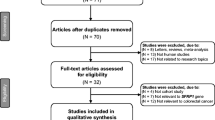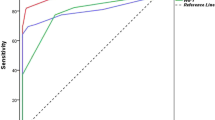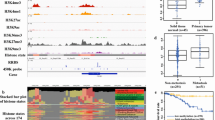Abstract
Colorectal cancer (CRC) is one of the leading causes of death worldwide. Aberrant DNA methylation has been recognized as one of the most common molecular alterations in CRC. The goal of this study was to investigate the diagnostic value of SFRP1 and SFRP2 methylation for CRC. A total of 80 pairs of CRC patients were recruited to test the association of SFRP1 and SFRP2 promotor methylation with CRC. Methylation assay was performed using quantitative methylation-specific polymerase chain reaction (qMSP) method. In this study, we found the methylation levels of SFRP1 and SFRP2 in CRC tumor tissues were significantly higher than those in the adjacent non-tumor tissues (SFRP1: P = 2E-5; SFRP2: P = 0.014). Further bioinformatics analysis of TCGA data confirmed the association of the two genes with CRC (SFRP1: P = 7E-21; SFRP2: P = 5E-24). Luciferase reporter gene assay showed that the recombinant plasmids with SFRP1 and SFRP2 fragments could significantly enhance promoter activity (SFRP1: P = 0.002; SFRP2: P = 0.004). In addition, SFRP1 and SFRP2 methylation were inversely correlated with the mRNA expression displayed by TCGA data mining (SFRP1: r = −0.432, P = 4E-11; SFRP2: r = −0.478, P = 1E-13). GEO data analysis indicated that SFRP1 and SFRP2 expression were increased in three CRC cell lines (COLO320, HCT116 and HT29) after 5′-AZA-deoxycytidine treatment, suggesting that DNA methylation played an important role in regulating gene expression of the two genes. Our results confirmed that promoter methylation of SFRP1 and SFRP2 contributed to the risk of CRC.




Similar content being viewed by others
References
Huang J, Tan ZR, Yu J, Li H, Lv QL, Shao YY, Zhou HH (2017) DNA hypermethylated status and gene expression of PAX1/SOX1 in patients with colorectal carcinoma. Onco Targets Ther 10:4739–4751
Li J, Chen C, Bi X, Zhou C, Huang T, Ni C, Yang P, Chen S, Ye M, Duan S (2017) DNA methylation of CMTM3, SSTR2, and MDFI genes in colorectal cancer. Gene 630:1–7
Hu H, Chen X, Wang C, Jiang Y, Li J, Ying X et al (2017) The role of TFPI2 hypermethylation in the detection of gastric and colorectal cancer. Oncotarget 8:84054–84065
Dashwood RH (1999) Early detection and prevention of colorectal cancer (review). Oncol Rep 6:277–281
Wu D, Chen X, Xu Y, Wang H, Yu G, Jiang L, Hong Q, Duan S (2017) Prognostic value of MLH1 promoter methylation in male patients with esophageal squamous cell carcinoma. Oncol Lett 13:2745–2750
Liu S, Chen X, Chen R, Wang J, Zhu G, Jiang J et al (2017) Diagnostic role of Wnt pathway gene promoter methylation in non small cell lung cancer. Oncotarget 8:36354–36367
Ma D, Jiang C, Hu X, Liu H, Li Q, Li T et al (2014) Methylation patterns of the IFN-gamma gene in cervical cancer tissues. Sci Rep 4:6331
Piras G, Monne M, Palmas AD, Calvisi A, Asproni R, Vacca F, Pilo L, Gabbas A, Latte G (2014) Methylation analysis of the phosphates and tensin homologue on chromosome 10 gene (PTEN) in multiple myeloma. Clin Epigenetics 6:16
Cahill N, Rosenquist R (2013) Uncovering the DNA methylome in chronic lymphocytic leukemia. Epigenetics 8:138–148
Chen C, Wang L, Liao Q, Huang Y, Ye H, Chen F et al (2013) Hypermethylation of EDNRB promoter contributes to the risk of colorectal cancer. Diagn Pathol 8:199
Wang Z, Yuan X, Jiao N, Zhu H, Zhang Y, Tong J (2012) CDH13 and FLBN3 gene methylation are associated with poor prognosis in colorectal cancer. Pathol Oncol Res 18:263–270
Oh TJ, Oh HI, Seo YY, Jeong D, Kim C, Kang HW, Han YD, Chung HC, Kim NK, An S (2017) Feasibility of quantifying SDC2 methylation in stool DNA for early detection of colorectal cancer. Clin Epigenetics 9:126
Huang J, Zhang YL, Teng XM, Lin Y, Zheng DL, Yang PY, Han ZG (2007) Down-regulation of SFRP1 as a putative tumor suppressor gene can contribute to human hepatocellular carcinoma. BMC Cancer 7:126
Takeda M, Nagasaka T, Dong-Sheng S, Nishie H, Oka T, Yamada E et al (2011) Expansion of CpG methylation in the SFRP2 promoter region during colorectal tumorigenesis. Acta Med Okayama 65:169–177
Park SK, Baek HL, Yu J, Kim JY, Yang HJ, Jung YS, Choi KY, Kim H, Kim HO, Jeong KU, Chun HK, Kim K, Park DI (2017) Is methylation analysis of SFRP2, TFPI2, NDRG4, and BMP3 promoters suitable for colorectal cancer screening in the Korean population? Intest Res 15:495–501
Bartak BK, Kalmar A, Peterfia B, Patai AV, Galamb O, Valcz G et al (2017) Colorectal adenoma and cancer detection based on altered methylation pattern of SFRP1, SFRP2, SDC2, and PRIMA1 in plasma samples. Epigenetics 12:751–763
Babaei H, Mohammadi M, Salehi R (2016) DNA methylation analysis of secreted frizzled-related protein 2 gene for the early detection of colorectal cancer in fecal DNA. Niger Med J 57:242–245
Zhang H, Zhu YQ, Wu YQ, Zhang P, Qi J (2014) Detection of promoter hypermethylation of Wnt antagonist genes in fecal samples for diagnosis of early colorectal cancer. World J Gastroenterol 20:6329–6335
Huang Z, Li L, Wang J (2007) Hypermethylation of SFRP2 as a potential marker for stool-based detection of colorectal cancer and precancerous lesions. Dig Dis Sci 52:2287–2291
Caldwell GM, Jones C, Gensberg K, Jan S, Hardy RG, Byrd P, Chughtai S, Wallis Y, Matthews GM, Morton DG (2004) The Wnt antagonist sFRP1 in colorectal tumorigenesis. Cancer Res 64:883–888
Li B, Chen X, Jiang Y, Yang Y, Zhong J, Zhou C, Hu H, Duan S (2017) CCL2 promoter hypomethylation is associated with gout risk in Chinese Han male population. Immunol Lett 190:15–19
Cannas V, Daino GL, Corona A, Esposito F, Tramontano E (2015) A luciferase reporter gene assay to measure Ebola virus viral protein 35-associated inhibition of double-stranded RNA-stimulated, retinoic acid-inducible gene 1-mediated induction of interferon beta. J Infect Dis 212(Suppl 2):S277–S281
Yu J, Zhai X, Li X, Zhong C, Guo C, Yang F, Yuan Y, Zheng S (2017) Identification of MST1 as a potential early detection biomarker for colorectal cancer through a proteomic approach. Sci Rep 7:14265
Yamashita K, Watanabe M (2009) Clinical significance of tumor markers and an emerging perspective on colorectal cancer. Cancer Sci 100:195–199
Li X, Kong L, Liao S, Lu J, Ma L, Long X (2017) The expression and significance of feces cyclooxygensae-2 mRNA in colorectal cancer and colorectal adenomas. Saudi J Gastroenterol 23:28–33
Wu Y, Gong L, Xu J, Mou Y, Xu X, Qian Z (2017) The clinicopathological significance of HES1 promoter hypomethylation in patients with colorectal cancer. Onco Targets Ther 10:5827–5834
Zarkavelis G, Boussios S, Papadaki A, Katsanos KH, Christodoulou DK, Pentheroudakis G (2017) Current and future biomarkers in colorectal cancer. Ann Gastroenterol 30:613–621
Sugai T, Yoshida M, Eizuka M, Uesugii N, Habano W, Otsuka K, Sasaki A, Yamamoto E, Matsumoto T, Suzuki H (2017) Analysis of the DNA methylation level of cancer-related genes in colorectal cancer and the surrounding normal mucosa. Clin Epigenetics 9:55
Chen WD, Han ZJ, Skoletsky J, Olson J, Sah J, Myeroff L, Platzer P, Lu S, Dawson D, Willis J, Pretlow TP, Lutterbaugh J, Kasturi L, Willson JKV, Rao JS, Shuber A, Markowitz SD (2005) Detection in fecal DNA of colon cancer-specific methylation of the nonexpressed vimentin gene. J Natl Cancer Inst 97:1124–1132
Huang S, Zhong X, Gao J, Song R, Wu H, Zi S et al (2014) Coexpression of SFRP1 and WIF1 as a prognostic predictor of favorable outcomes in patients with colorectal carcinoma. Biomed Res Int 2014:256723
Veeck J, Niederacher D, An H, Klopocki E, Wiesmann F, Betz B, Galm O, Camara O, Dürst M, Kristiansen G, Huszka C, Knüchel R, Dahl E (2006) Aberrant methylation of the Wnt antagonist SFRP1 in breast cancer is associated with unfavourable prognosis. Oncogene 25:3479–3488
Ba S, Xuan Y, Long ZW, Chen HY, Zheng SS (2017) MicroRNA-27a promotes the proliferation and invasiveness of Colon Cancer cells by targeting SFRP1 through the Wnt/beta-catenin signaling pathway. Cell Physiol Biochem 42:1920–1933
Liu Y, Zhou Q, Zhou D, Huang C, Meng X, Li J (2017) Secreted frizzled-related protein 2-mediated cancer events: Friend or foe? Pharmacol Rep 69:403–8
Worm Orntoft MB (2018) Review of blood-based colorectal Cancer screening: how far are circulating cell-free DNA methylation markers from clinical implementation? Clin Colorectal Cancer 17:e415–ee33
Harada T, Yamamoto E, Yamano HO, Nojima M, Maruyama R, Kumegawa K, Ashida M, Yoshikawa K, Kimura T, Harada E, Takagi R, Tanaka Y, Aoki H, Nishizono M, Nakaoka M, Tsuyada A, Niinuma T, Kai M, Shimoda K, Shinomura Y, Sugai T, Imai K, Suzuki H (2014) Analysis of DNA methylation in bowel lavage fluid for detection of colorectal cancer. Cancer Prev Res 7:1002–1010
Acknowledgments
The research is supported by grants from K. C. Wong Magna Fund in Ningbo University.
Author information
Authors and Affiliations
Contributions
SD and HH contribute to the conception, design and final approval of the submitted version. TW, CZ, RP and HH contribute to interpretation of data and completion of figures and Tables. YY, BL and JZ contribute to performing the experiments and analyzing the data. HH, TW and SD contribute to writing the paper. All the authors have read and approved the final manuscript.
Corresponding authors
Ethics declarations
Conflicts of Interest
The authors declare no conflicts of interest.
Additional information
Haochang Hu and Tiangong Wang are co-first authors of this work.
Rights and permissions
About this article
Cite this article
Hu, H., Wang, T., Pan, R. et al. Hypermethylated Promoters of Secreted Frizzled-Related Protein Genes are Associated with Colorectal Cancer. Pathol. Oncol. Res. 25, 567–575 (2019). https://doi.org/10.1007/s12253-018-0505-6
Received:
Accepted:
Published:
Issue Date:
DOI: https://doi.org/10.1007/s12253-018-0505-6




